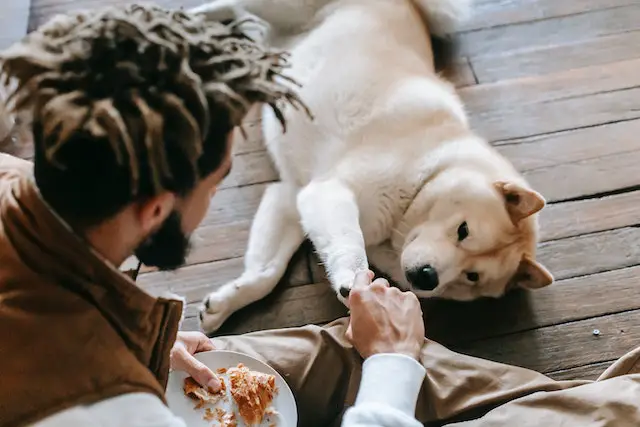Let’s discuss some human foods dogs can not eat…
We all know how tempting it is to share our favorite snacks with our furry friends, but did you know that some human foods can be downright dangerous for dogs?
In this blog post, we’ll uncover the ultimate guide to human foods that dogs should steer clear of, helping you keep your four-legged pals safe and healthy.
Human Foods Dogs Can Not Eat
There are several human foods that dogs should avoid, as they can be toxic to them, some common examples include chocolate, grapes and raisins, and onions and garlic.
These foods can cause various health issues in dogs, ranging from gastrointestinal problems to organ damage.
1. Chocolate
Chocolate is a delicious treat for humans, but it can be extremely dangerous for dogs. The reason behind this lies in the presence of a compound called theobromine, which is toxic to dogs.
When ingested, theobromine can cause various symptoms in dogs, including vomiting, diarrhea, increased heart rate, tremors, and even seizures.
In severe cases, it can be fatal. It is crucial to keep chocolate out of reach of dogs and seek immediate veterinary attention if they accidentally consume it.
2. Raw Potatoes
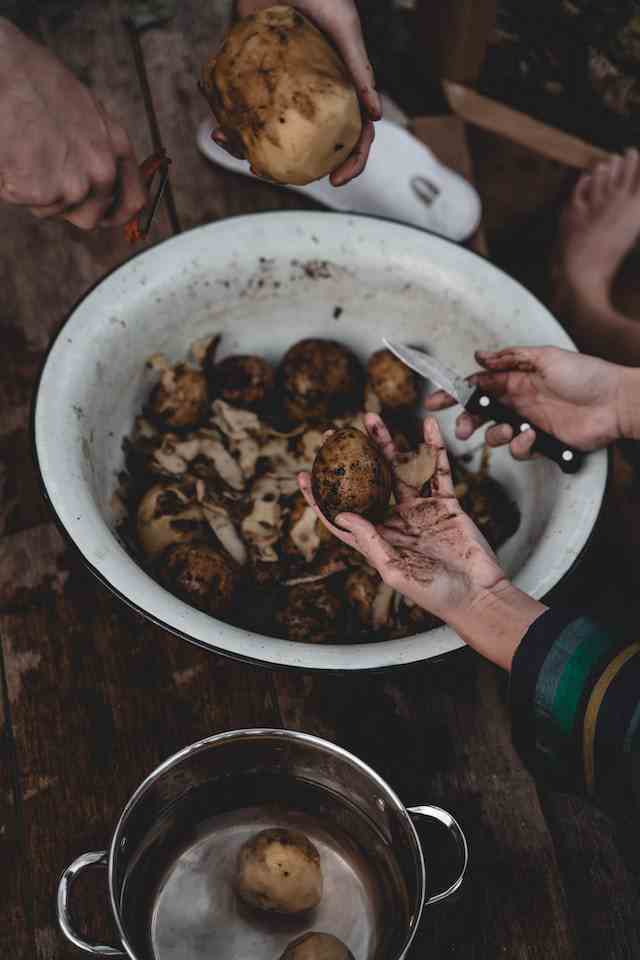
Raw potatoes are part of the list of human foods that dogs should not eat. Dogs should not consume raw potatoes, primarily because they contain solanine, a toxic compound found in the leaves, stems, and unripe parts of the potato plant.
Ingesting solanine can cause gastrointestinal upset, such as vomiting and diarrhea, in dogs. Additionally, raw potatoes are difficult for dogs to digest properly, potentially leading to digestive issues and discomfort.
It is safest to avoid feeding raw potatoes to dogs and opt for cooked or mashed potatoes instead, without any added seasonings or ingredients that may be harmful to dogs.
3. Grapes and Raisins
Grapes and raisins are among the human foods that dogs should not consume. These fruits can be toxic to dogs and may lead to severe health issues, such as kidney failure.
The exact reason why grapes and raisins are harmful to dogs is still unknown, but even small amounts can be dangerous.
It is best to avoid feeding grapes and raisins to dogs to ensure their well-being and prevent any potential health risks.
4. Onions and Garlic
Onions and garlic are part of a group of foods that are toxic to dogs. They contain compounds called thiosulphates, which can cause anemia in dogs by damaging their red blood cells.
The toxic effects can be cumulative, meaning even small amounts over time can be dangerous.
Symptoms of onion and garlic poisoning in dogs include weakness, vomiting, diarrhea, and pale gums. Therefore, it is best to avoid feeding dogs onions and garlic to ensure their safety and well-being.
5. Alcohol
Alcohol is a substance that should never be given to dogs, as it can be highly toxic to their system. Dogs lack the necessary enzymes to metabolize alcohol, leading to rapid absorption into their bloodstream.
This can result in a range of dangerous effects, including central nervous system depression, respiratory distress, vomiting, and even coma or death.
It is crucial to keep all alcoholic beverages out of reach of dogs to ensure their safety and well-being.
6. Avocado
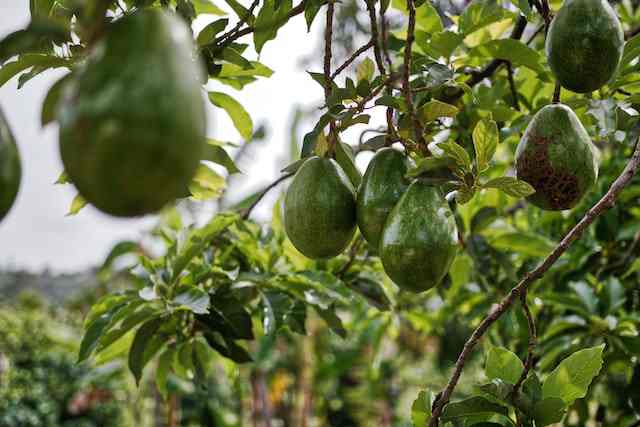
Avocado is a popular fruit among humans, but it is not safe for dogs to consume.
Dogs should not eat avocado because it contains a substance called persin, which can be toxic to them. Persin can cause gastrointestinal upset, vomiting, and diarrhea in dogs.
Additionally, avocados have a high-fat content, which can lead to pancreatitis in dogs. It is best to avoid feeding avocados to dogs to ensure their safety and well-being.
7. Caffeine
Caffeine is a stimulant commonly found in foods and beverages like coffee, tea, chocolate, and energy drinks. Dogs should not consume caffeine due to its toxic effects on their system.
It can cause increased heart rate, restlessness, tremors, vomiting, and even seizures in dogs. Additionally, caffeine can lead to dehydration and potentially be fatal if ingested in large amounts.
Therefore, it is crucial for dog owners to keep caffeine-containing products out of their pet’s reach to ensure their well-being.
8. Artificial Sweeteners
Artificial sweeteners, such as xylitol, are highly toxic to dogs and should be strictly avoided. When ingested, these sweeteners can cause a sudden and severe drop in blood sugar levels, leading to hypoglycemia in dogs.
This can result in symptoms like weakness, seizures, and even liver failure. The artificial sweetener xylitol is commonly found in sugar-free gum, candies, and baked goods, making it crucial for dog owners to be vigilant and keep these products out of their pet’s reach.
As a responsible pet owner, it is important to stick to dog-safe food options and avoid feeding them anything that contains artificial sweeteners.
9. Salty Foods
Salty foods should be avoided by dogs as they can cause a range of health issues. Firstly, excessive salt intake can lead to dehydration in dogs, as it disrupts the balance of electrolytes in their body.
Secondly, high sodium levels can put a strain on a dog’s kidneys, potentially leading to kidney damage or failure. Additionally, salty foods can cause an increase in blood pressure, posing a risk for cardiovascular problems.
Lastly, consumption of salty foods may also lead to symptoms such as vomiting, diarrhea, and excessive thirst in dogs.
10. Nuts
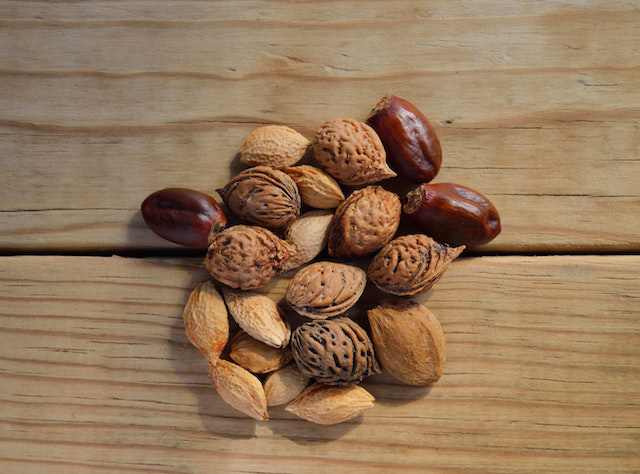
Nuts are generally not recommended for dogs to consume due to several reasons. Firstly, certain nuts, such as macadamia nuts, can be toxic to dogs and can cause symptoms like weakness, vomiting, and tremors.
Secondly, nuts are high in fat, which can lead to digestive issues and potentially pancreatitis in dogs. Additionally, some nuts, like almonds and walnuts, can pose a choking hazard or cause obstructions in a dog’s digestive system.
Lastly, nuts may also contain salt or seasonings that are harmful to dogs. In conclusion, it is best to avoid feeding nuts to dogs to ensure their well-being and safety.
11. Fatty Foods
Fatty foods should be avoided in a dog’s diet due to several reasons. Firstly, consuming fatty foods can lead to weight gain and obesity, increasing the risk of various health issues such as heart disease and diabetes in dogs.
Secondly, fatty foods can cause pancreatitis, a painful and potentially life-threatening condition in dogs. Thirdly, these foods can lead to gastrointestinal upset, including diarrhea and vomiting.
Lastly, some fatty foods may contain toxic substances like onions or garlic, which can be harmful to dogs. Overall, it is best to keep fatty foods out of a dog’s diet to maintain their health and well-being.
12. Raw Eggs
Raw eggs are commonly considered a risky food for dogs due to the potential presence of bacteria like Salmonella or E. coli. These bacteria could lead to food poisoning and gastrointestinal issues in dogs.
Additionally, raw egg whites contain avidin, an enzyme inhibitor that can interfere with the absorption of biotin, a B vitamin essential for dogs.
Consequently, it is advisable to avoid feeding raw eggs to dogs to ensure their safety and well-being.
13. Sugary Foods
Sugary foods, such as candy, chocolate, and desserts, should be avoided by dogs due to their potentially harmful effects.
Firstly, dogs lack the necessary enzymes to properly digest sugar, leading to digestive issues like upset stomachs and diarrhea.
Additionally, consuming sugary foods can lead to obesity in dogs, which can lead to various health problems, including diabetes and joint issues.
Moreover, sugary foods can be toxic to dogs, as some contain xylitol, a sugar substitute that is highly toxic to dogs and can cause seizures and liver failure. Therefore, it is best to keep sugary foods away from dogs to ensure their health and well-being.
14. Spices
Spices are a common part of human foods that can be harmful to dogs and should be avoided.
Dogs have a more sensitive digestive system compared to humans, and certain spices can cause digestive issues, irritation, or even toxicity in dogs.
Spices like garlic, onion, and nutmeg are particularly dangerous for dogs as they can cause damage to their red blood cells, leading to anemia or other serious health problems.
It is best to stick to dog-friendly foods and consult with a veterinarian before introducing any new spices or seasonings to a dog’s diet.
15. Mushrooms
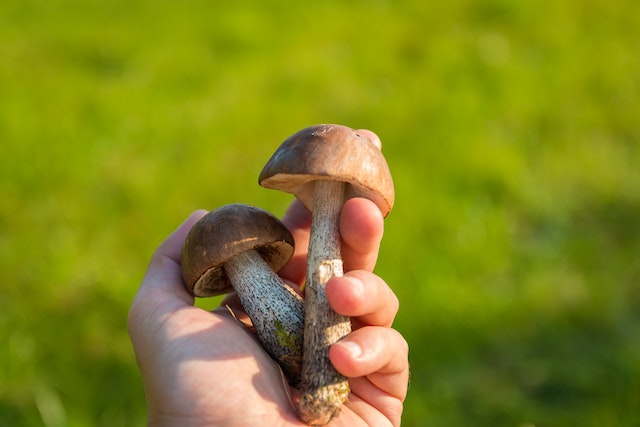
Wild mushrooms are a dangerous food for dogs and should be strictly avoided. Firstly, many varieties of wild mushrooms can be toxic to dogs, causing symptoms ranging from mild gastrointestinal upset to severe organ damage.
Secondly, it is difficult to distinguish between toxic and non-toxic mushrooms, making it risky to allow dogs to consume any wild mushrooms.
Additionally, some edible mushrooms can still cause digestive issues in dogs, leading to discomfort and potential health complications.
Lastly, since dogs cannot communicate their symptoms effectively, it is best to err on the side of caution and keep them away from wild mushrooms altogether.
16. Fruit Pits and Seeds
Fruit pits and seeds are not suitable for dogs to consume due to several reasons. Firstly, they can pose a choking hazard, especially for smaller dogs.
Secondly, many fruit pits and seeds contain toxic substances, such as cyanide, which can be harmful to dogs when ingested.
Additionally, these pits and seeds can obstruct the digestive tract, leading to digestive issues or even requiring surgical intervention.
It is always best to remove pits and seeds from fruits before offering them to dogs to ensure their safety and well-being.
17. Ice cream
Ice cream is a delicious treat enjoyed by humans, but it is not suitable for dogs. Dogs lack the necessary enzymes to break down lactose, a sugar found in milk products like ice cream.
Consuming ice cream can lead to digestive issues such as diarrhea, bloating, and gas in dogs.
Additionally, the high sugar content in ice cream can contribute to obesity and dental problems in dogs. It is best to avoid giving ice cream to dogs and opt for dog-friendly alternatives instead.
18. Pizza
Pizza is a popular human food that dogs should avoid. Firstly, it contains ingredients that are harmful to dogs, such as garlic, onions, and cheese that can cause digestive issues and even toxicity.
Secondly, the high-fat content in pizza can lead to pancreatitis in dogs. Additionally, the crust can be difficult for dogs to digest and may cause gastrointestinal upset.
Lastly, pizza often contains toppings like pepperoni or sausage that are high in sodium, which can be detrimental to a dog’s health. It is best to keep pizza away from our furry friends to ensure their well-being.
19. Yeast Dough
Yeast dough is a type of dough made from yeast, flour, water, and other ingredients. While it may be harmless to humans, dogs should not consume yeast dough due to several reasons.
First, yeast dough can expand in the dog’s stomach, leading to bloating and potentially causing a life-threatening condition called gastric dilatation-volvulus.
Second, yeast produces alcohol as it ferments, which can intoxicate dogs and cause alcohol poisoning. Additionally, the ingestion of raw dough may lead to digestive issues, such as gas, discomfort, and even bowel obstruction in dogs.
Therefore, it is important to keep yeast dough away from dogs to ensure their safety and well-being.
20. Unripe Tomatoes
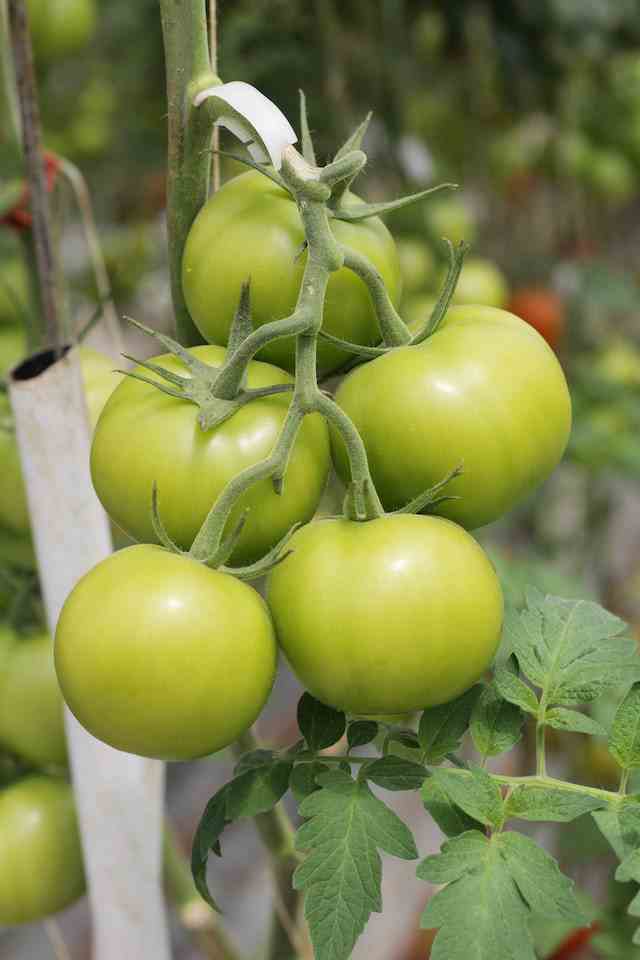
Unripe tomatoes are part of the list of human foods that dogs should not eat due to their potential toxicity.
Unripe tomatoes contain high levels of solanine, a toxic substance that can cause gastrointestinal upset, including vomiting and diarrhea, in dogs.
Additionally, solanine can affect dogs’ nervous systems, leading to symptoms such as weakness, tremors, and even seizures.
It is important to ensure that dogs do not consume unripe tomatoes to prevent potential health risks and discomfort.
Conclusion
In conclusion, it’s crucial to remember that not all human foods are safe for our furry friends. While it may be tempting to share our meals with them, it’s important to prioritize their health and well-being.
So, next time you’re enjoying a delicious treat, remember to keep your pup’s safety in mind and opt for dog-friendly alternatives instead. Happy and healthy eating for both you and your furry companion!

